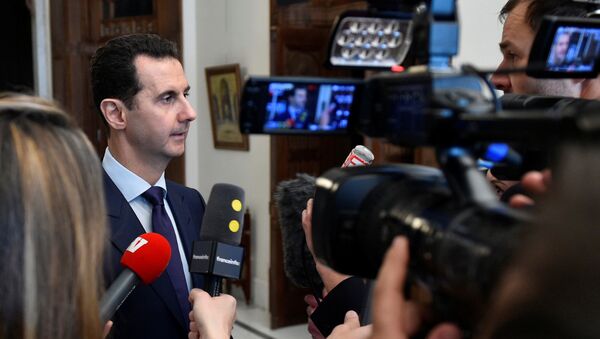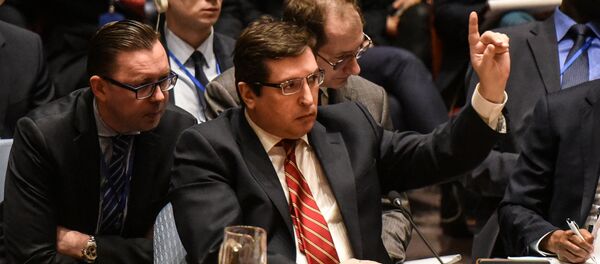"Any willingness of western powers, including the United States and France, to talk with Syria… is a positive development," Jatras said on Friday. "To the extent this means the end of the ‘regime change’ imperative, a path toward ending the war may begin to be discernible."
Jatras welcomed Macron’s statement at the press conference that France did not require President Bashar Assad to step down as part of the process of building an inclusive and sustainable political solution in Syria.
Trump appeared to go along with Macron’s statement on Thursday. However, Jatras cautioned that US policy could still quickly revert to its regular hard line on Syria, insisting that the Damascus government be removed as part of the process to end the six-year civil war.
"The trouble is, we have heard this sort of thing before. Secretary of State Rex Tillerson and even US ambassador to the UN Nikki Haley made similar statements just before the April 2017 false flag chemical attack in Idlib, to which President Trump responded with cruise missiles," he recalled.
After the Idlib attack, Tillerson and Haley immediately reverted to the regular US hard-line rhetoric insisting the Syrian president must be removed from office, Jatras pointed out. He expressed concern that Macron might abandon his willingness to let Assad stay in power if another alleged incident took place.
"Will President Macron do the same the minute the next inevitable incident occurs?" he asked.
Macron’s statement, while constructive and welcome, should not be allowed to distract attention from the basic ceasefire initiative that President Donald Trump and Russian President Vladimir Putin launched on July 7 at their bilateral meeting on the sidelines of the G20 summit in Hamburg, Jatras said.
"Right now, the big game in town is the agreement on July 7 between President Trump and Russian President Vladimir Putin for a local ceasefire in southwest Syria, which could be of critical importance in finally bringing the war in that county to an end," he stated.
It appeared from the areas where the ceasefire had been established that Trump and Tillerson had won Israeli approval for the ceasefire as well, and Iran probably supported it too, Jatras observed.
"The choice of the ceasefire location bordering on the Golan Heights indicates that the United States must have cleared the arrangement with the Israelis. Conversely, Moscow would hardly have moved without securing a no-objection from Damascus and Tehran," he noted.
The ability of Trump and Putin to win the support of both Israel and Iran for the ceasefire agreement increased the prospects that it would last and become a crucial stepping stone towards establishing a wider peace in Syria at last, Jatras remarked.
"By thus bringing along on the arrangement their most fractious and bitterly antagonistic allies, Washington and Moscow may have the best chance of edging toward an end of hostilities," he said.
Paris’ support for the initiative was welcome, but neither France nor any other European nation compared in influence and power to the United States and Russia in preserving and advancing the Syrian peace process, Jatras explained.
"If France wants to come along for the ride, well and good: But let’s not pretend our European satellites are independent actors in any case," he concluded.
More than 600,000 people are believed to have been killed in the Syrian conflict over the past six years since the Arab Spring disturbances, backed by the United States, the United Kingdom and France began in early 2011.




